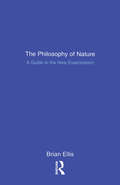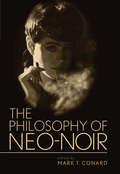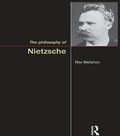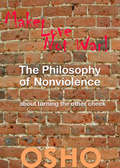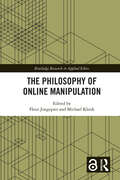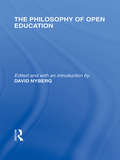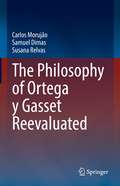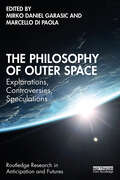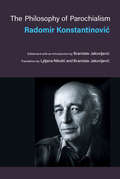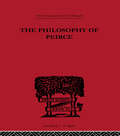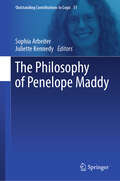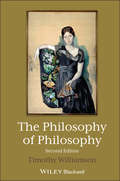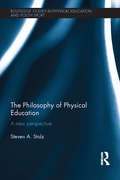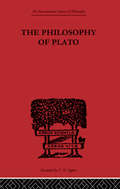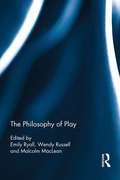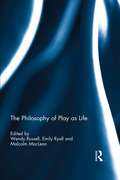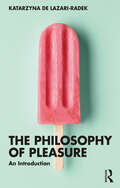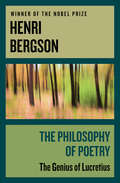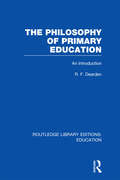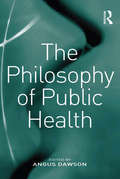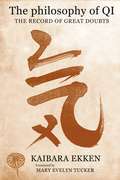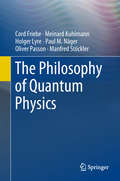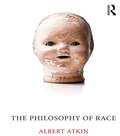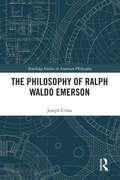- Table View
- List View
The Philosophy of Nature: A Guide to the New Essentialism
by Brian EllisIn "The Philosophy of Nature," Brian Ellis provides a clear and forthright general summation of, and introduction to, the new essentialist position. Although the theory that the laws of nature are immanent in things, rather than imposed on them from without, is an ancient one, much recent work has been done to revive interest in essentialism and "The Philosophy of Nature" is a distinctive contribution to this lively current debate. Brian Ellis exposes the philosophical and scientific credentials of the prevailing Humean metaphysic as less than compelling and makes the case for new essentialism as an alternative metaphysical perspective in lucid and unambiguous terms. This book develops this alternative metaphysic and considers the consequences for philosophy, and for some other areas of investigation, of working with such a metaphysic. Ellis argues that these consequences are profound and that a new essentialism provides a comprehensive new philosophy of nature for a modern scientific understanding of the world.
The Philosophy of Neo-Noir (The Philosophy of Popular Culture #Ppcs)
by Mark T. ConardA collection of essays exploring the philosophical elements present in Neo-Noir films.Film noir is a classic genre characterized by visual elements such as tilted camera angles, skewed scene compositions, and an interplay between darkness and light. Common motifs include crime and punishment, the upheaval of traditional moral values, and a pessimistic stance on the meaning of life and on the place of humankind in the universe. Spanning the 1940s and 1950s, the classic film noir era saw the release of many of Hollywood’s best-loved studies of shady characters and shadowy underworlds, including Double Indemnity, The Big Sleep, Touch of Evil, and The Maltese Falcon. Neo-noir is a somewhat loosely defined genre of films produced after the classic noir era that display the visual or thematic hallmarks of the noir sensibility.The essays collected in The Philosophy of Neo-Noir explore the philosophical implications of neo-noir touchstones such as Blade Runner, Chinatown, Reservoir Dogs, Memento, and the films of the Coen brothers. Through the lens of philosophy, Mark T. Conard and the contributors examine previously obscure layers of meaning in these challenging films. The contributors also consider these neo-noir films as a means of addressing philosophical questions about guilt, redemption, the essence of human nature, and problems of knowledge, memory and identity. In the neo-noir universe, the lines between right and wrong and good and evil are blurred, and the detective and the criminal frequently mirror each other's most debilitating personality traits. The neo-noir detective?more antihero than hero?is frequently a morally compromised and spiritually shaken individual whose pursuit of a criminal masks the search for lost or unattainable aspects of the self. Conard argues that the films discussed in The Philosophy of Neo-Noir convey ambiguity, disillusionment, and disorientation more effectively than even the most iconic films of the classic noir era. Able to self-consciously draw upon noir conventions and simultaneously subvert them, neo-noir directors push beyond the earlier genre's limitations and open new paths of cinematic and philosophical exploration.Praise for The Philosophy of Neo-Noir“Conard can feel confident that these terrific essays will be of interest to film enthusiasts, particularly fans of Neo-Noir. Additionally, for those who come to this volume with some background in philosophy, not only will they be pleased to find fellow philosophers offering accessible introductions to philosophical thinkers and ideas but they are sure to increase their understanding of noir, Neo-Noir, and many familiar film titles, as well as more deeply appreciate the ways in which popular film and television offer wide and varied avenues to doing good philosophy.” —Kimberly A. Blessing, co-editor of Movies and the Meaning of Life“Taking up such latter-day classics as Chinatown, Blade Runner, and Memento, this volume explores how contemporary filmmakers have taken up the challenge of classic film noir and broadened the genre. In this analysis, even the pastel shades of South Beach take on a dark coloring in Miami Vice. These probing essays locate what is neo in Neo-Noir and thus define it as a postmodern genre.” —Paul Cantor, author of Gilligan Unbound: Pop Culture in the Age of Globalization“This collection will serve as a terrific interdisciplinary guide through the chaotic, intriguing world of postmodernist thought as it relates to film and philosophy.” —Choice
The Philosophy of Nietzsche: A Guide (Oxford Guides To Philosophy Ser. #4)
by Rex WelsonThis important new introduction to Nietzsche's philosophical work provides readers with an excellent framework for understanding the central concerns of his philosophical and cultural writings. It shows how Nietzsche's ideas have had a profound influence on European philosophy and why, in recent years, Nietzsche scholarship has become the battleground for debates between the analytic and continental traditions over philosophical method. The book is divided into three parts. In the first part, the author discusses morality, religion and nihilism to show why Nietzsche rejects certain components of the Western philosophical and religious traditions as well as the implications of this rejection. In the second part, the author explores Nietzsche's ambivalent and sophisticated reflections on some of philosophy's biggest questions. These include his criticisms of metaphysics, his analysis of truth and knowledge, and his reflections on the self and consciousness. In the final section, Welshon discusses some of the ways in which Nietzsche transcends, or is thought to transcend, the Western philosophical tradition, with chapters on the will to power, politics, and the flourishing life.
The Philosophy of Nonviolence
by Osho Osho International FoundationWhile nonviolence is a philosophy to Mahatma Gandhi; it is not a philosophy to Osho, but an experience. Osho talks about his understanding of reverence for life, he does not use the word non-violence.
The Philosophy of Online Manipulation (Routledge Research in Applied Ethics)
by Michael Klenk Fleur JongepierAre we being manipulated online? If so, is being manipulated by online technologies and algorithmic systems notably different from human forms of manipulation? And what is under threat exactly when people are manipulated online? This volume provides philosophical and conceptual depth to debates in digital ethics about online manipulation. The contributions explore the ramifications of our increasingly consequential interactions with online technologies such as online recommender systems, social media, user friendly design, microtargeting, default settings, gamification, and real time profiling. The authors in this volume address four broad and interconnected themes: What is the conceptual nature of online manipulation? And how, methodologically, should the concept be defined? Does online manipulation threaten autonomy, freedom, and meaning in life and if so, how? What are the epistemic, affective, and political harms and risks associated with online manipulation? What are legal and regulatory perspectives on online manipulation? This volume brings these various considerations together to offer philosophically robust answers to critical questions concerning our online interactions with one another and with autonomous systems. The Philosophy of Online Manipulation will be of interest to researchers and advanced students working in moral philosophy, digital ethics, philosophy of technology, and the ethics of manipulation.
The Philosophy of Open Education (International Library of the Philosophy of Education Volume 15)
by David Nyberg'Open', 'informal', and 'humanistic' are words used to describe new styles of education which depart from ordinary or traditional education. Too often, however, these adjectives are used in a strongly polemical or self-justifying rather than analytical way. Often too, the grounds for accepting or rejecting open education are political or moral, instead of being based on a consideration of the nature of open education and its strength and weaknesses. This collection of essays is central to the debate on open education, analyzing the important concepts in the field. The contributions, all written by authorities on the philosophy of education, deal with problems of definition, knowledge, socialization, freedom, cultural perspective, and unique meanings and metaphors.
The Philosophy of Ortega y Gasset Reevaluated
by Carlos Morujão Samuel Dimas Susana RelvasThe present text surveys and reevaluates the meaning and scope of Ortega y Gasset’s philosophy. The chapters reveal the most important aspects of his history such as the Neokantian training he went thru in Germany as well as his discovery of Husserl’s phenomenology around 1912. The work also covers his original contributions to philosophy namely vital and historical reason - and the cultural and educational mission he proposed to achieve. The Spanish – and to a certain extent the European – circumstance was the milieu from which his work emerged but this does not limit Ortega’s scope. Rather, he believed that universal truths can only emerge from the particulars in which they are embedded. The publication in 2010 of a critical edition of his Complete Works opened worldwide access for many unpublished manuscripts, and some of his lectures. There is renewed interest among students and researchers in Ortega and this book uniquely delivers scholarship on his content in English.
The Philosophy of Outer Space: Explorations, Controversies, Speculations (Routledge Research in Anticipation and Futures)
by Mirko Daniel Garasic Marcello Di PaolaThis volume provides a rigorous philosophical investigation of the rationales, challenges, and promises of the coming Space Age.Over the past decade, space exploration has made significant and accelerating progress, and its potential has attracted growing attention from science, states, businesses, innovators, as well as the media and society more generally. Yet philosophical theorizing concerning the premises, values, meanings, and impacts of space exploration is still in its infancy, and this potentially immense field of study is far from mainstream yet. This book advances outer space philosophy by integrating key scientific and societal debates sparked by recent developments in space research and activities with conceptual, existential, ethical, aesthetic, and political themes and concerns. It maps various regions of philosophical exploration, reflection, and speculation regarding humanity’s present and future emanations into outer space, to promote a broad, rich, and nuanced societal debate regarding this transformative enterprise, which is as stimulating as it can be disorienting.This book will be a fascinating read for academics, researchers, and students interested in philosophy, space studies, science and technology studies, future studies, and sustainability.
The Philosophy of Parochialism
by Radomir KonstantinovicThe Philosophy of Parochialism is Radomir Konstantinovic’s (1928–2011) most celebrated and reviled book. First published in Belgrade as Filosofija palanke in 1969, it attracted keen attention and controversy through its unsparing critique of Serbian and any other nationalism in Yugoslavia and beyond. The book was prophetic, seeming to anticipate not only the bloody disintegration of Yugoslavia in the 1990s, but also the totalitarian turn in politics across the globe in the first decades of the new century. With this translation, English-speaking audiences can at last discover one of the most original writers of eastern European late modernism, and gain an important and original perspective into contemporary politics and culture in the West and beyond. This is a book that seems to age in reverse, as its meanings become deeper and more universal with the passage of time. Konstantinovic’sbookresists easy classification, mixing classical, Montaigne-like essay, prose poetry, novel, and literary history. The word “philosophy” in the book’s title refers to the solitary activity of reflection and critical thinking, and is also paradoxical: according to the author, a defining characteristic of parochialism is precisely its intolerance toward this kind of self-reflexivity. In Konstantinovic’s analysis, parochialism is not a simply a characteristic of a geographical region or a cultural, political, and historical formation—these are all just manifestations of the parochial spirit as the spirit of insularity. His book illuminates the current moment, in which insularity undergirds not only ethnic and national divisions, but also dictates the very structure of everyday life, and where individuals can easily find themselves locked in an echo chamber of social media. The Philosophy of Parochialism can help us understand better not only the dead ends of ethnic nationalism and other atavistic ideologies, but also of those cultural forces such as digital technologies that have been built on the promise of overcoming those ideologies.
The Philosophy of Peirce: Selected Writings (International Library of Philosophy)
by Justus BuchlerFirst published in 2000. Routledge is an imprint of Taylor & Francis, an informa company.
The Philosophy of Penelope Maddy (Outstanding Contributions to Logic #31)
by Juliette Kennedy Sophia ArbeiterThis volume features more than 20 essays that explore the work of one of the most important contemporary philosophers of mathematics. It will help readers to better appreciate this significant and prolific philosopher. Within philosophy of mathematics, Penelope Maddy initially advocated realism. She then went on to advance naturalism. Both of her positions became very influential in the field, along with her other work in the philosophy of logic. The contributors comment on and otherwise engage with Maddy’s work. They also weigh in on the state of set theory and its philosophy, the philosophy and history of logic, naturalism, skepticism, and the myriad other areas to which Maddy left her mark. Overall, coverage traces her influence on these various ideas over the years. It will also help readers to better understand how philosophers working at the forefront of these areas see these concepts today. These essays will be essential reading for the wide group of philosophers working in these different areas as well as graduate students studying philosophy of mathematics and logic and the other related issues to which Maddy has contributed. The volume will also appeal to logicians and set theorists in general, as well as to philosophers working in analytic philosophy more widely, as well as to those working in the history of philosophy.
The Philosophy of Philosophy (The Blackwell / Brown Lectures in Philosophy)
by Timothy WilliamsonThe expanded new edition of one of the most influential and controversial books about the nature of philosophy published in the past several decades The Philosophy of Philosophy presents an original, unified concept of philosophy as a non-natural science. In this provocative work, distinguished philosopher Timothy Williamson challenges widely-held assumptions and clarifies long-standing misconceptions about the methodology and nature of philosophical inquiry. The author rejects the standard narratives of contemporary philosophy developed from naturalism, the linguistic turn, postmodern irony, and other prominent trends of the twentieth century. Viewing the method of philosophy as evolving from non-philosophical pursuits, Williamson provides readers with fresh insight into the “self-image” of philosophy and offers new ways of understanding what philosophy is and how it actually works. Now in its second edition, this landmark volume comprises the original book and the author’s subsequent work. New topics include the recent history of analytic philosophy, assessments of experimental philosophy, theories of concepts and understanding, Wittgensteinian approaches, popular philosophy, naturalism, morally-loaded examples in philosophy, philosophical applications of scientific methods, and many more. This edition features the author’s latest thoughts on a variety of issues, autobiographical reflections, and replies to critics. Proposes an alternative narrative about the nature of philosophy Argues that the common assumption of philosophical exceptionalism is false Highlights the similarities between philosophy and the other sciences in both methodology and subject matter Explores why contemporary philosophy has failed to articulate an adequate methodology Emphasizes increasing the methodological standards of reasoning in philosophy The Philosophy of Philosophy, Second Edition remains essential reading for philosophers, scholars, graduate and advanced undergraduate students in philosophy, and other readers with a sustained interest in the method and rationale of the doing of philosophy.
The Philosophy of Physical Education: A New Perspective (Routledge Studies in Physical Education and Youth Sport)
by Steven A. StolzThe discipline area of physical education has historically struggled for legitimacy, sometimes being seen as a non-serious pursuit in educational terms compared to other subjects within the school curriculum. This book represents the first attempt in nearly thirty years to offer a coherent philosophical defence and conceptualisation of physical education and sport as subjects of educational value, and to provide a philosophically sound justification for their inclusion in the curriculum. The book argues that rather than relegating the body to “un-thinking” learning, a person’s essential being is not confined to their rationality but involves an embodied dimension. It traces the changing conceptions of the body, in philosophy and theology, that have influenced our understanding of physical education and sport, and investigates the important role that embodiment and movement play in learning about, through and in physical education. Physical education is defended as a vital and necessary part of education because the whole person goes to school, not just the mind, but the thinking, feeling and acting facets of a person. It is argued that physical education has the potential to provide a multitude of experiences and opportunities for students to become aware of their embodiment, explore alternative modes of awareness and to develop insights into and new modes of being not available elsewhere in the curriculum, and to influence moral character through the support of a moral community that is committed to that practice. Representing a sophisticated and spirited defence of the educational significance and philosophical value of physical education and sport, this book will be fascinating reading for any advanced student or researcher with an interest in physical education, the philosophy of sport or the philosophy of education.
The Philosophy of Plato (International Library of Philosophy)
by Rupert C. LodgeFirst Published in 2000. Routledge is an imprint of Taylor & Francis, an informa company.
The Philosophy of Play
by Emily Ryall Wendy Russell Malcolm MacLeanPlay is a vital component of the social life and well-being of both children and adults. This book examines the concept of play and considers a variety of the related philosophical issues. It also includes meta-analyses from a range of philosophers and theorists, as well as an exploration of some key applied ethical considerations. The main objective of The Philosophy of Play is to provide a richer understanding of the concept and nature of play and its relation to human life and values, and to build disciplinary and paradigmatic bridges between scholars of philosophy and scholars of play. Including specific chapters dedicated to children and play, and exploring the work of key thinkers such as Plato, Sartre, Wittgenstein, Gadamer, Deleuze and Nietzsche, this book is invaluable reading for any advanced student, researcher or practitioner with an interest in education, playwork, leisure studies, applied ethics or the philosophy of sport.
The Philosophy of Play as Life
by Emily Ryall Wendy Russell Malcolm MacLeanIt is now widely acknowledged that play is central to our lives. As a phenomenon, play poses important questions of reality, subjectivity, competition, inclusion and exclusion. This international collection is the third in a series of books (including The Philosophy of Play and Philosophical Perspectives on Play) that aims to build paradigmatic bridges between scholars of philosophy and scholars of play. Divided into four sections (Play as Life, Play as Games, Play as Art and Play as Politics), this book sheds new light on the significance of play for both children and adults in a variety of cultural settings. Its chapters encompass a range of philosophical areas of enquiry such as metaphysics, aesthetics and ethics, and the spectrum of topics explored includes games, jokes, sport and our social relationship with the Internet. With contributions from established and emerging scholars from around the world, The Philosophy of Play as Life is fascinating reading for all those with an interest in playwork, the ethics and philosophy of sport, childhood studies or the philosophy of education.
The Philosophy of Pleasure: An Introduction
by Katarzyna de Lazari-RadekThe experience of pleasure, alongside pain, is a primary element of human life. It rules our instincts and desires for food, sex and avoiding various forms of harm. Crucial to psychological and social well-being, it has preoccupied philosophers from Aristotle to John Stuart Mill and plays a fundamental role in moral and ethical theory, especially utilitarianism. More recently, it has become a central subject for psychologists, biologists and neuroscientists.Yet it remains an elusive and deceptively difficult concept. What is pleasure? How does it differ from happiness? Should we value pleasure? Should we value only pleasure? Which theories of pleasure are most plausible? In this rigorous and comprehensive introduction to the topic, Katarzyna de Lazari-Radek unpacks and assesses these questions and many more, including: The history of pleasure from ancient China, India and Greece to modern times Pleasure, sensation, feeling and consciousness What scientific research reveals about the nature of pleasure – can pleasure be measured scientifically? "Higher" and "lower" pleasures The relation between happiness and pleasure Pleasure and pain Pleasure and animals Pleasure as an ultimate good and the relation between pleasure and rationality. The Philosophy of Pleasure: An Introduction is essential reading for students of ethics and political philosophy, and also suitable for those studying related disciplines such as psychology, politics and sociology.
The Philosophy of Poetry: The Genius of Lucretius
by Henri BergsonThis is a partial translation by Wade Baskin of the original French work Ecrits et Paroles (a 3 volume set, 665 pages) published between 1957 and 1959 by Henri Bergson. It includes the translation from Bergson&’s introduction to a French ed. of De rerum natura, by Lucretius published in 1884 under the title: Extraits de Lucre`ce.
The Philosophy of Poetry: The Genius of Lucretius
by Henri BergsonThis is a partial translation by Wade Baskin of the original French work Ecrits et Paroles (a 3 volume set, 665 pages) published between 1957 and 1959 by Henri Bergson. It includes the translation from Bergson&’s introduction to a French ed. of De rerum natura, by Lucretius published in 1884 under the title: Extraits de Lucre`ce.
The Philosophy of Primary Education: An Introduction (Routledge Library Editions: Education)
by R F DeardenThis volume provides a rigorous examination of theoretical concepts such as need, interest, growth, play, experience, activity and self-expression. It also makes an important contribution towards getting a closely argued educational theory. In the first part of the book the author establishes general aims and ends with suggestions as to what the curriculum ought to be. The second part is concerned with the procedures of learning and teaching appropriate to such a curriculum.
The Philosophy of Public Health
by Angus DawsonPublic health is a particular area of medical practice that raises a series of philosophical issues that require urgent discussion. The philosophy of public health includes metaphysical questions such as, what do we mean by 'public' in public health? How ought we to conceptualise the idea of 'populations'? Are they merely aggregations of individuals? It also includes epistemological questions such as, what methods are most appropriate for thinking about public health? How do empirical and normative issues relate to each other? Controversial ethical, political and social issues, including those relating to vaccinations, the threat of pandemics and possible restrictions to individual liberties, public health research, screening and obesity policy should also be considered. This volume includes a diverse set of papers exploring a number of the most important theoretical and practical issues that arise across the whole field of the philosophy of public health.
The Philosophy of Qi: The Record of Great Doubts (Translations from the Asian Classics)
by Kaibara EkkenThe Record of Great Doubts emphasizes the role of qi in achieving a life of engagement with other humans, with the larger society, and with nature as a whole. Rather than encourage transcendental escapism or quietism, Ekken articulates a philosophy of material force as a basis of living a life of commitment to the world. In this spirit, moral cultivation is not an isolated or a self-centered preoccupation, but an activity that occurs within the dynamic forces of nature and amid the rigorous demands of society. In this context, a vitalism of qi is an emergent force, not only providing the philosophical grounding for this vibrant interaction but also giving a basis for an investigation of the natural world that plumbs the principle within things. Ekken thus aimed to articulate a creative and dynamic milieu for moral education, political harmony, social coherence, and agricultural sustainability. The Record of Great Doubts embodies Ekken's profound commitment to Confucian ideas and practices as a method for establishing an integrative ethical vision, one he hoped would guide Japan through a new period of peace and stability. A major philosophical treatise in the Japanese Neo-Confucian tradition, The Record of Great Doubts illuminates a crucial chapter in East Asian intellectual history.
The Philosophy of Quantum Physics
by William D. Brewer Paul M. Näger Cord Friebe Meinard Kuhlmann Holger Lyre Oliver Passon Manfred StöcklerThis book provides a thorough and up-to-date introduction to the philosophy of quantum physics. Although quantum theory is renowned for its spectacular empirical successes, controversial discussion about how it should be understood continue to rage today. In this volume, the authors provide an overview of its numerous philosophical challenges: Do quantum objects violate the principle of causality? Are particles of the same type indistinguishable and therefore not individual entities? Do quantum objects retain their identity over time? How does a compound quantum system relate to its parts? These questions are answered here within different interpretational approaches to quantum theory. Finally, moving to Quantum Field Theory, we find that the problem of non-locality is exacerbated. Philosophy of quantum physics is aimed at philosophers with an interest in physics, while also serving to familiarize physicists with many of the essential philosophical questions of their subject.
The Philosophy of Race
by Albert Atkin"Race" is so highly charged and loaded a concept it often hampers critical thinking about racial practice and policy. A philosophical approach allows us to isolate and analyse the key questions: What is race? Can we do without race? What is racism and why is it wrong? What should our policies on race and racism be? The Philosophy of Race presents a concise and up-to-date overview of the central philosophical debates about race. It then builds on this philosophical foundation to analyse the sociopolitical questions of racism and race-relevant policy. Throughout, the discussion is illustrated with a wide range of examples: Afro-American 'blackness'; British-Asian racial formation; Aboriginal identity in Australia; the racial grouping of Romany-Gypsies and Jews in Europe; categories of race in Brazil; and the concept of model minorities in the US and UK.
The Philosophy of Ralph Waldo Emerson (Routledge Studies in American Philosophy)
by Joseph UrbasThis study offers the first comprehensive account of Emerson's philosophy since his philosophical rehabilitation began in the late 1970s. It builds on the historical reconstruction proposed in the author's previous book, Emerson's Metaphysics, and like that study draws on the entire Emerson corpus—the poetry and sermons included. The aim here is expository. The overall though not exclusive emphasis is on identity, as the first term of Emerson's metaphysics of identity and flowing or metamorphosis. This metaphysics, or general conception of the nature of reality, is what grounds his epistemology and ethics, as well as his esthetic, religious, and political thought. Acknowledging its primacy enables a general account like this to avoid the anti-realist overemphasis on epistemology and language that has often characterized rehabilitation readings of his philosophy. After an initial chapter on Emerson's metaphysics, the subsequent chapters devoted to the other branches of his thought also begin with their "necessary foundation" in identity, which is the law of things and the law of mind alike. Perception of identity in metamorphosis is what characterizes the philosopher, the poet, the scientist, the reformer, and the man of faith and virtue. Identity of mind and world is felt in what Emerson calls the moral sentiment. Identity is Emerson's answer to the Sphinx-riddle of life experienced as a puzzling succession of facts and events.
